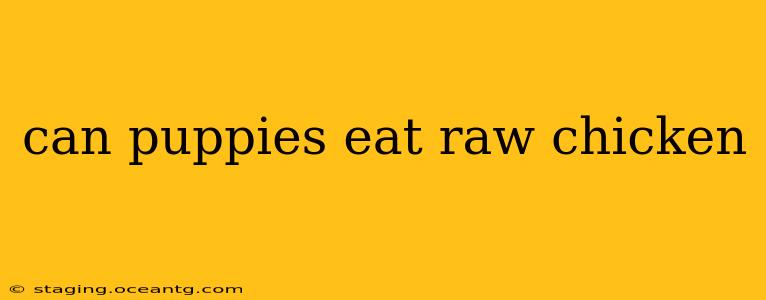Can Puppies Eat Raw Chicken? A Vet's Perspective on Risks and Rewards
The question of whether puppies can eat raw chicken is a complex one, sparking debate among pet owners and veterinarians alike. While the idea of a raw food diet for dogs is gaining popularity, it's crucial to understand the potential dangers before introducing raw chicken – or any raw meat – into your puppy's diet. The short answer is: no, it's generally not recommended.
This article delves into the potential benefits and significant risks associated with feeding raw chicken to puppies, addressing common concerns and offering safer alternatives to ensure your furry friend's health and well-being.
What are the potential benefits of feeding raw chicken to puppies?
Proponents of raw feeding argue that raw chicken provides certain nutritional advantages. They claim it offers higher bioavailability of certain nutrients compared to cooked chicken, meaning the puppy's body can absorb and utilize these nutrients more efficiently. Some believe it can lead to improved digestion, shinier coats, and increased energy levels. However, these claims are often anecdotal and lack rigorous scientific backing. The benefits, if any, must be carefully weighed against the substantial risks involved.
What are the risks of feeding raw chicken to puppies?
The risks associated with feeding raw chicken to puppies significantly outweigh any potential benefits. The most significant dangers include:
-
Bacterial Contamination: Raw chicken is frequently contaminated with harmful bacteria like Salmonella, Campylobacter, and E. coli. Puppies, with their still-developing immune systems, are highly susceptible to these infections, which can lead to severe diarrhea, vomiting, dehydration, and even death.
-
Parasitic Infections: Raw chicken can harbor parasites like Toxoplasma gondii, which can cause toxoplasmosis, a potentially fatal disease. This is particularly risky for pregnant women who may come into contact with the puppy's feces.
-
Nutritional Imbalances: Formulating a balanced raw diet for a growing puppy is extremely challenging and requires specialized knowledge of canine nutrition. Improperly balanced raw diets can lead to serious nutritional deficiencies or excesses, impacting your puppy's development and long-term health.
Is raw chicken safe for adult dogs?
While the risks are somewhat reduced in adult dogs with established immune systems, the potential for bacterial and parasitic infections still exists. Feeding raw chicken to adult dogs is still generally discouraged, unless under strict veterinary supervision and with a carefully planned, balanced raw diet formulated by a veterinary nutritionist.
What are some safer alternatives to raw chicken for puppies?
Instead of raw chicken, opt for high-quality commercially prepared puppy food formulated to meet the specific nutritional needs of growing dogs. These foods undergo rigorous testing to ensure safety and provide a balanced diet. You can also consult with your veterinarian or a veterinary nutritionist to create a balanced homemade diet using cooked chicken or other safe protein sources. Always ensure the chicken is thoroughly cooked to an internal temperature of 165°F (74°C) to kill any harmful bacteria.
Can I give my puppy cooked chicken?
Cooked chicken, unlike raw chicken, is a much safer option. Ensure it's thoroughly cooked and boneless to prevent choking hazards. However, cooked chicken should only be given as an occasional treat and should not form the basis of your puppy's diet. Always prioritize a complete and balanced puppy food to ensure optimal growth and development.
My puppy ate raw chicken – what should I do?
If your puppy has ingested raw chicken, monitor them closely for any signs of illness, such as vomiting, diarrhea, lethargy, or loss of appetite. Contact your veterinarian immediately if you notice any symptoms. Early intervention is crucial in treating bacterial or parasitic infections.
In conclusion, while the allure of raw feeding may be tempting, the significant health risks associated with raw chicken, especially for puppies, make it a dangerous choice. Prioritizing a safe and balanced diet, whether commercial or homemade, is crucial for ensuring your puppy grows into a healthy and happy adult dog. Always consult your veterinarian before making any significant changes to your puppy's diet.
